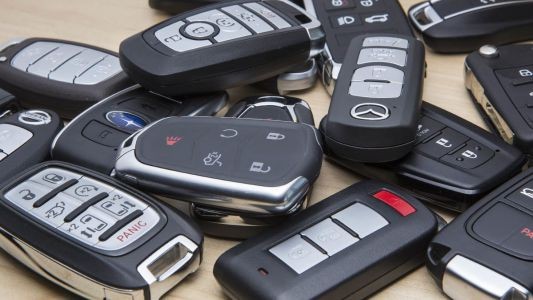It’s a scenario every car owner dreads: you approach your vehicle, key fob in hand, press the unlock button, and… nothing. Your key fob stubbornly refuses to unlock the doors, leaving you stranded and frustrated. Whether you’re facing a dead battery, worn-out buttons, or a more complex car lock issue, understanding the potential causes is the first step towards resolving this common problem. While some fixes are simple DIY tasks, others may require the expertise of a professional.
To simplify the troubleshooting process, we can categorize the reasons why your key fob won’t unlock doors into two main areas: problems originating from the key fob itself, and issues related to your car’s door locks. Let’s delve into the most frequent culprits in each category and explore potential solutions to get you back into your car.
Understanding Why Your Key Fob Might Fail
Before assuming the worst, it’s helpful to understand the two primary areas where problems can arise when your key fob malfunctions. The issue could stem from the key fob itself, hindering its ability to send the unlock signal, or the problem might lie within your car’s locking mechanism, preventing it from receiving and acting upon the signal. By considering both possibilities, you can more effectively diagnose and address why your key fob won’t unlock doors.
Key Fob Problems
1. Dead or Weak Battery
A depleted battery is often the simplest and most common reason why a car key fob will not unlock doors. Key fobs rely on battery power to transmit signals to your car, and as the battery weakens, its signal strength diminishes.
Symptoms:
- Intermittent Functionality: The key fob works sporadically, sometimes unlocking the doors and sometimes not.
- Reduced Range: You need to be very close to the car for the key fob to function, or it may not work at all even at close range.
- Dim or No Indicator Light: The LED light on your key fob may be dim or not illuminate when you press a button.
Solution:
Replacing the battery is the first and easiest step to troubleshoot a key fob that won’t unlock doors.
- DIY Battery Replacement: Most key fobs can be opened with a small flathead screwdriver or by sliding open a battery compartment. Check your owner’s manual for specific instructions. Carefully remove the old battery and replace it with a new one of the correct type (usually a CR2032 or similar button cell battery).
- Professional Help: If you’re uncomfortable changing the battery yourself, or if replacing the battery doesn’t solve the problem, consult a locksmith or car dealership.
Having spare key fob batteries on hand can be a wise precaution to avoid being caught off guard by a dead battery.
2. Worn Out Buttons
Over time and with frequent use, the buttons on your key fob can wear out. The internal contacts beneath the buttons can become damaged or less responsive, leading to inconsistent or non-existent functionality.
Symptoms:
- Inconsistent Operation: The key fob only works after pressing the button multiple times or with excessive force.
- Specific Buttons Not Working: Some buttons on the key fob might function (like the lock button), while others (like the unlock button) become unresponsive.
- Button Feels Mushy or Loose: The button may feel different to the touch compared to other buttons that are still working correctly.
Solution:
- Key Fob Housing Replacement: In some cases, you can replace just the outer housing of the key fob, which includes new buttons. This can be a more cost-effective solution than replacing the entire key fob.
- Professional Locksmith or Dealer: For more complex button issues or if you’re not comfortable with DIY repairs, a professional locksmith specializing in car keys or your car dealership can diagnose and repair or replace the key fob.
3. Key Fob Deprogramming
Although less common, it’s possible for your key fob to become deprogrammed from your car’s system. This means the car no longer recognizes the unique signal from your key fob.
Causes:
- Accidental Deprogramming: Certain sequences of button presses or key turns, sometimes inadvertently performed, can deprogram a key fob, especially in older vehicles.
- Electronic Interference: In rare cases, strong electromagnetic interference could potentially disrupt the key fob’s programming.
Symptoms:
- Complete Key Fob Failure: The key fob stops working entirely – none of the buttons function. This can mimic the symptoms of a dead battery.
Solution:
- Reprogramming: Refer to your car owner’s manual for instructions on how to reprogram your key fob. Some vehicles allow for DIY reprogramming procedures.
- Professional Locksmith or Dealer: If DIY reprogramming is not possible or unsuccessful, a locksmith with car key programming tools or your car dealership can reprogram the key fob to your vehicle.
Car Door Lock Problems
Even if your key fob is functioning perfectly, the problem might lie within your car’s door lock mechanisms themselves.
4. Door Lock Mechanism Blockage
Physical obstructions or blockages within the door lock mechanism can prevent it from unlocking, regardless of whether you use the key fob or the manual key.
Causes:
- Debris and Dirt: Dirt, dust, and debris can accumulate inside the lock mechanism, hindering its movement.
- Corrosion and Rust: Moisture and humidity can lead to corrosion and rust within the lock, causing parts to seize up.
- Lack of Lubrication: Over time, the lubrication in the lock mechanism can dry out, leading to stiff or blocked movement.
Symptoms:
- Key Fob and Manual Key Failure: Neither the key fob nor the manual key will unlock the door.
- Stiff or Jammed Manual Lock: The manual lock feels stiff or jammed when you try to operate it with the key or the interior lock lever.
Solution:
- Lubrication: Apply a lubricant like WD-40 or a specialized lock lubricant into the keyhole and around the door lock mechanism. This can help to loosen any blockages caused by dirt or corrosion.
- Professional Locksmith: If lubrication doesn’t resolve the blockage, a locksmith can disassemble and clean the door lock mechanism, removing any obstructions and ensuring smooth operation.
5. Uncoupled or Broken Lock Parts
Like any mechanical system, the internal components of your car door locks can wear, break, or become uncoupled over time.
Causes:
- Wear and Tear: Regular use can cause internal parts to wear out or break.
- Impact Damage: Forced entry attempts or accidents can damage internal lock components.
Symptoms:
- Sound of Mechanism but Door Remains Locked: You might hear the sound of the door lock actuator working when you press the key fob, but the door doesn’t unlock.
- Other Entry Methods Fail: Manual key and interior lock levers also fail to unlock the door.
Solution:
- Professional Locksmith or Mechanic: This type of issue usually requires professional diagnosis and repair. A locksmith or mechanic can access the door lock mechanism, identify the broken or uncoupled parts, and perform the necessary repairs or replacements. This might involve replacing a small component or the entire door lock assembly.
6. Damaged Wiring
Car door locks are electrically operated, and problems within your car’s electrical wiring system can prevent the unlock signal from reaching the door lock actuators.
Causes:
- Wire Damage: Wires can become damaged due to wear, corrosion, or rodent damage.
- Loose Connections: Electrical connectors can become loose or corroded, interrupting the electrical circuit.
Symptoms:
- Key Fob Failure Only: The key fob won’t unlock the doors, but the manual key and interior lock levers still work. This suggests the problem is with the electrical control of the locks.
- Other Electrical Issues: You might experience other electrical problems in your car, such as interior lights not working or power windows malfunctioning, which could indicate a broader wiring issue.
Solution:
- Electrical System Diagnosis: A mechanic or a locksmith with expertise in car electronics can diagnose electrical wiring problems. They will test the wiring and connections to the door lock actuators to identify any breaks, shorts, or loose connections.
- Wiring Repair or Replacement: Depending on the nature of the damage, the wiring may need to be repaired or replaced.
Key Takeaway: When to Call a Professional
While some key fob issues, like a dead battery, are easily resolved with a DIY fix, other problems, particularly those involving car door lock mechanisms or electrical wiring, often require professional expertise. If you’ve tried basic troubleshooting steps and your key fob still won’t unlock doors, it’s advisable to consult a qualified locksmith specializing in automotive locks and keys or a trusted car mechanic. They possess the tools, knowledge, and experience to accurately diagnose the problem and implement the appropriate solution, ensuring you regain access to your vehicle quickly and safely.

